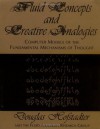251
Followers
4
Following
Manny Rayner's book reviews
I love reviewing books - have been doing it at Goodreads, but considering moving here.
Currently reading
The Greatest Show On Earth: The Evidence For Evolution
R in Action
Fluid Concepts and Creative Analogies
McGee on Food and Cooking: An Encyclopedia of Kitchen Science, History and Culture
Epistemic Dimensions of Personhood
Pattern Recognition and Machine Learning (Information Science and Statistics)
Relativity, Thermodynamics and Cosmology
The Cambridge Handbook of Second Language Acquisition
Souvenirs d'égotisme
 This is a book by a writer, primarily for other writers. Stendhal is carrying out an interesting experiment, and I'm surprised that it hasn't had more of an impact.
This is a book by a writer, primarily for other writers. Stendhal is carrying out an interesting experiment, and I'm surprised that it hasn't had more of an impact. Unless you have an unusually positive view of human nature, you'll agree that most autobiographies are dreadful collections of self-serving lies. (No, you said "Tony Blair". I never mentioned him). In general, it's easy to point fingers, and of course some people are worse than others. But even the most careful, consciencious, impartial seeker after truth is likely to end up with a variant on the usual mess. Simone de Beauvoir, who I think is about as honest as it gets, complains bitterly that her memoirs are filled with mauvaise foi. Churchill's History of the Second World War is brilliant, but contains flagrant half-truths and omissions; he wasn't allowed to write about Turing and the code-breakers because it was still top secret, and it was psychologically impossible for him to give the requisite weight to the story of the Eastern front.
If de Beauvoir and Churchill can't get it right, what hope for mere mortals? Stendhal was well aware of the problems, and tried to cut the Gordian knot. He wrote down his story very quickly, with minimal or no revision, as if he was writing a series of letters; he also decided from the beginning that it would be published at least ten years after his death, so he wouldn't have to worry about hurting people's feelings. The result is interestingly different from a normal autobiography. It's unavoidably incoherent in places, and often comes across as just rough notes - there are places where the editor says he's left up to three quarters of a page of blank space, presumably intending to fill in the gap but never getting around to it. Often, he talks about people and places without adequate introduction, and I had one finger permanently in the end-notes - Stendhal scholars have spent over 150 years trying to figure out obscure references, and there are still instances where they're stumped.
But you really do have the feeling that this is someone who's not just trying to be honest, but actually succeeding a lot of the time. Three things in particular stand out. He spends a great deal of time regretting love affairs that either went wrong or never happened; he is appalled by the dishonesty and mediocrity of nearly all his fellow-writers; and, although he dearly loves his friends and does his best to explain their stirling qualities, he's completely unable to do so. They're just, you know, great guys.
Even though the first impression is of a very unfinished work, there are lovely fragments scattered through the text. It's rare to have three pages go by without finding something you immediately want to quote. I think this was my favourite passage, though many others ran it close:
Well, I had better get out of my cocoon and start making dinner. But I do so wish I could reply to him! If you happen to have a time machine, please deliver this note to M. Beyle in 1833; tell him that his book was by no means as dull as he feared, and is still appreciated in 2010. He seemed concerned about its future success, and I'd like to reassure him that his experiment worked out very well.Avez-vous jamais vu, lecteur bénévole, un ver à soie qui a mangé assez de feuille de mûrier? La comparaison n'est pas noble, mais elle est si juste! Cette laide bête ne veut plus manger, elle a besoin de grimper et de faire sa prison de soie.
Tel est l'animal nommé écrivain. Pour qui a goûté de la profonde occupation d'écrire, lire n'est qu'un plaisir secondaire. Tant de fois je croyais être à 2 heures, je regardais ma pendule: il était 6 heures et demie. Voilà ma excuse pour avoir noirci tant de papier.
My translation:
Have you ever seen, gentle reader, a silkworm who has eaten enough mulberry leaves? It's not a flattering comparison, but a very fair one! This ugly creature no longer wants to eat, it wants to climb up somewhere and start making its prison of silk.
The animal called the writer is similar. For someone who has tasted the profound pleasure of writing, reading is no more than a secondary pleasure. Many times I've believed it was 2 in the afternoon, and then looked at the clock to find it was 6.30. There's my excuse for having blackened so much paper.
___________________________________________
I just can't stop thinking about Stendhal's unusual book! Have to give it another star in recognition of that :)











